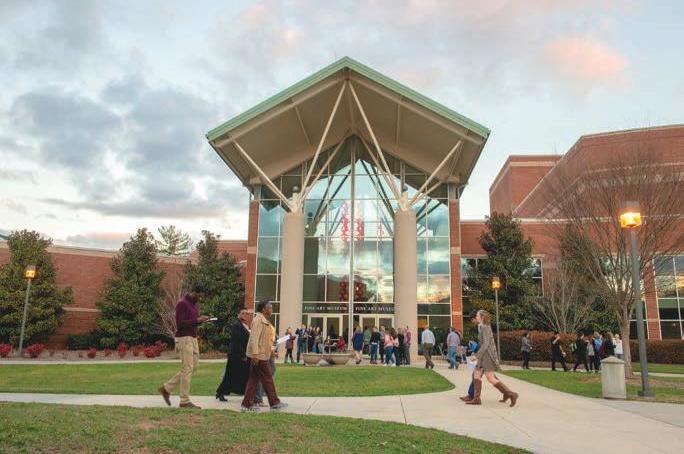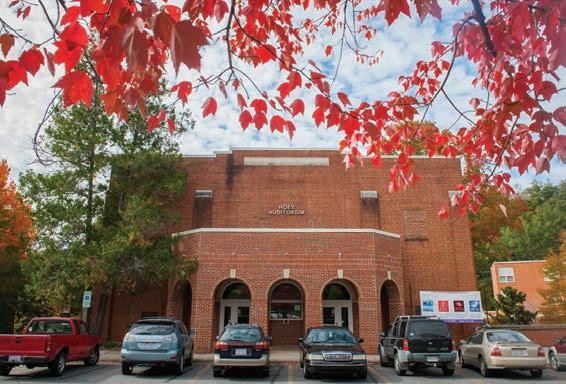
5 minute read
WCU removes name 'Hoey' from campus auditorium
Bardo Arts Center adapts to remote audience
BY ANDREW DUNDAS C ONTRIBUTING WRITER
This fall, Western Carolina University’s John W. Bardo Fine & Performing Arts Center celebrates 15 years of visual and performing arts programming for students and audiences in surrounding counties. The anniversary, however, comes in the midst of COVID-19-related closures and cancellations affecting events and spaces.
The Bardo Arts Center contains and manages the WCU Fine Art Museum, BAC Performance Hall, and Niggli Studio Theatre. These venues host a range of activities, including art exhibitions, live music and dance, workshops, acting and literary presentations. The Bardo Arts Center also houses many of the classrooms and studio spaces for the WCU School of Art and Design.
“Although our season is definitely different than we would have hoped for an anniversary season,” Marketing Director Jill Jacobs said, “we will be celebrating in the fall with our series of online programs including our main museum exhibition, Cultivating Collections, which features work from the WCU Fine Art Museum’s permanent collection.”
The Bardo Arts Center closed its doors on March 17 and canceled all events being held after March 5. Since then, they have created virtual experiences to replace in-person ones. Throughout April and May, Jacobs said, they livestreamed artist’s talks and theatrical programs, reaching the same or greater numbers of viewer than on-site showings.
Continuing into the year with these digital opportunities, Jacobs said, “Bardo Arts Center is excited to be a part of the South Arts Southern Circuit Tour of Independent Filmmakers for the 2020-2021 season and will
present six independent documentaries in a virtual format with opportunities for the public to interact virtually with the filmmakers.” Some events could not be held online, however, and the Bardo Arts Center offered three options for patrons who had already bought tickets. Ticket-holders could choose either a full refund, a voucher for a future performance or leave their purchase as a contribution to the Bardo Arts Center. Jacobs said,
Trustees unanimously approved a resolution removing the name “Hoey” from a campus performance facility.
The action to rename the facility University Auditorium came Monday, June 29, during a special called meeting of the board, which was held by teleconference because of protocols related to COVID-19.
Clyde R. Hoey, the facility’s namesake, is a former governor of North Carolina and state and federal legislator who actively opposed civil rights legislation and favored racial segregation. He also opposed statehood for Hawaii because the territory contained “only a small percentage of white people.”
“It is the policy of the university to honor the core values of diversity, equality and social justice, and the university is devoted to the development of a culture of inclusivity,” the board’s resolution states. “The university reserves the right to terminate a facility naming when the facility naming is contrary to the best interests of the university.”
Bryant Kinney, chair of the board, said that he and his fellow trustees thought it was important for the university to take this action.
“The board feels strongly that we needed to take this step to reflect the values of today’s Western Carolina University campus,” Kinney said. “We are not an institution that honthat honors diversity, equality and social justice.”
The action to change the auditorium’s name is “long the contribution option which did help offset some of the missing revenue.” Regardless, she said, the Bardo Arts Center will lose tens of thousands of dollars from ticket sales.
Despite these losses, the Bardo Art Center has not had to lay off any staff, Jacobs said. Employees who could work remotely began to do so on March 17, those who could not were given special paid leave through the UNC System.
“Reopening Bardo Arts Center to the public is still a fluid situation and each arts discipline has its own unique requirements to protect artists and audiences,” she said.
Consulting with arts organizations, the CDC and WCU, Bardo Arts Center is developing a reopening plan that considers everyone’s safety. “Bardo Arts Center would love readers to know that although our doors might be closed, the arts will always be open. We will continue providing as many digital arts experiences as we can and will be in touch with the public as soon as we are able to welcome our communi
Learn more
The Bardo Arts Center offers a number of virtual opportunities on their website, including on-demand seminars, a virtual 360-degree museum tour and films from the School of Stage and Screen’s, Virtual Controlled Chaos Film Festival. These resources can be found at arts.wcu.edu/virtual.
WCU removes name ‘Hoey’ from campus auditorium
The Western Carolina University Board of
ors a past that supported inequality. We are an institution
ty back into our building,” Jacobs said. “Well over 50 percent of the patrons chose

overdue,” WCU Chancellor Kelli R. Brown said. “I am proud that WCU is taking this proactive step today as we model our core values of diversity and inclusion,” Brown said. “The values and views of the auditorium’s now former namesake do not correspond with the values and views of Western Carolina University.” Ricardo Nazario-Colón, WCU’s chief diversity officer, commended the board for changing the facility’s name. “Today’s action is more than symbolic,” NazarioColón said. “It demonstrates that we as an organization have the capacity to listen, evolve and possess the fortitude to stand on the side of goodness. Thank you for leading the way and thank you to each board member.” Completed in 1939, the historic 450-seat auditorium was the university’s first dedicated performance space and helped WCU expand its music and arts offerings. The facility was renovated in the late 1980s.
The auditorium — which is still used for some performances, as well as for rehearsals, set design and storage — is slated for eventual demolition as part of the university’s longrange master plan, said Interim Provost Richard Starnes.
The 1,000-seat Performance Hall in the John W. Bardo Fine and Performing Arts Center has become WCU’s primary space for theatrical performances since its completion in 2005. The university’s long-range master plan calls for additional performance space to be built adjacent to Bardo before to the smaller auditorium is taken down.










